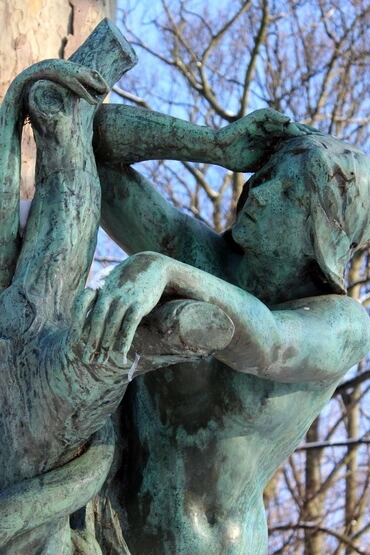Erläuterung zu Genesis 3:1
原作者: Brian David (机器翻译成: Deutsch)

Schlangen stehen für das, was wir mit unseren körperlichen Sinnen erkennen, und für das Denken, das auf unseren Sinnen beruht. Da die Menschen der Urkirche immer äußerlicher geworden waren, waren sie anfällig für die Verlockung, ihren Sinnen mehr zu vertrauen als der Führung des Herrn. Das galt insbesondere für das Selbstverständnis, das den Menschen gegeben worden war und das durch die Frau repräsentiert wird. Das Essen von den Bäumen im Garten stand für die Aufnahme von Wünschen nach guten und wahren Ideen aus dem Wissen, das ihnen vom Herrn gegeben wurde.
Hier sehen wir also zum ersten Mal, wie die Menschen mit ihren eigenen Sinnen den Herrn tatsächlich befragen. Mit ihren Sinnen wollten sie das Wissen erforschen, das die Früchte des Gartens darstellten, aber sie fragten sich, warum ihnen der Baum der Erkenntnis verwehrt wurde.
(参考: Himmlischen Geheimnissen 194, 195, 196, 197)
Arcana Coelestia#7780
7780. 'Even to the firstborn of the servant-girl who is behind the mill' means falsified truths of faith that occupy the very last place. This is clear from the meaning of 'the firstborn' as faith, dealt with immediately above in 7779, and since faith is meant, so is truth in its entirety because truth, being that which one ought to believe, is the component of faith; and from the meaning of 'a servant-girl' as a rather external affection for truth, or an affection for knowledge, dealt with in 1895, 2567, 3835, 3849, and 'the servant-girl behind the mill' as the most external affection for knowledge since 'behind the mill' means that which occupies the very last place. The expression 'behind the mill' is used because 'the mill' has reference to matters of faith. For by means of a mill grain is ground into flour and so prepared for making bread, and 'flour' means truth which results in good, 'bread' the actual good that results from it. Thus 'sitting at the mill' is acquiring and learning the kinds of things that will be of service to faith, and through faith of service to charity. This is why when the ancients described learning the basic elements of faith they described it as 'sitting at the mill', or learning elements even more basic as 'sitting behind the mill'. It is because such things were meant that in His teachings about the final period of the Church the Lord says,
Two women grinding at the mill; one will be taken and the other will be left behind. Matthew 24:41.
These words would never have been used if 'the mill' had not meant matters of faith. For what 'the mill' and 'grinding' mean in the internal sense, see 4335. With regard to the truths of faith that occupy the first place and those that occupy the very last, it should be recognized that the truths of faith which emanate directly from the good of charity occupy the first place, for they are the outward form taken by good, whereas the truths which occupy the last place are bare truths. For when truths derive in succession from good, each degree of them departs further away from it, till at length they become bare truths. This is the kind of truths meant by 'servant-girls behind mills'.






